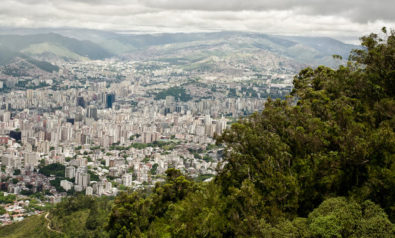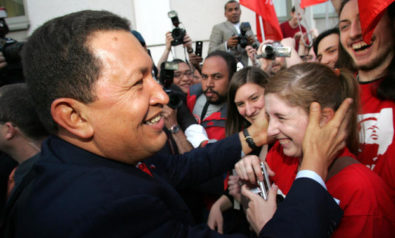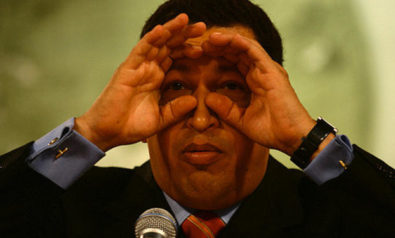Chavez has used his personal charisma backed by generous aid spending to build an anti-empire to counter the US in its crusade for free trade. But though he is ideologically opposed to the US economic system, he is realistically reliant on its power.
Upon meeting the President of the United States for the first time, Hugo Chavez handed Barack Obama a copy of Eduardo Galleano’s classic book, Open Veins of Latin America. The gesture spoke to Chavez’s anti-imperialist rhetoric in foreign policy, but also to the root of its power. Chavez has attempted to reclaim centuries of resource exploitation at the hands of first world economies, by redirecting oil revenue towards the disenfranchised. While Venezuela is dependent on oil for 95% of its exports, it has used the proceeds to fund $82bn in grants and subsidies to over 40 countries from 2005 to 2011. In real terms, Venezuela has redistributed the equivalent of the Marshall Plan that rebuilt Europe following WWII.
These expenditures give teeth to a dramatic expansion in Venezuela’s foreign policy. For a country of its size in a fairly geopolitically stable region, Venezuela commands an inordinate share of international attention. Since 1999, Chavez has channeled his country’s oil wealth into a self-styled anti-imperial world vision that has allowed him to leverage allies and create his own anti-empire. But, his counterpunch to global imperialism is in itself fueled by the same market system that it seeks to destroy. The US accounts for 40% of Venezuela’s oil exports, and Venezuelan oil for 8% of US consumption. In this respect, Chavez’s foreign policy, seems contradictory, for it rests on contesting the global economic philosophy and power of his nation’s largest trading partner.
Bolivarian Internationalism
Chavez’s ultimate world vision reflects that of his hero, the Latin American independence revolutionary, Simón Bolívar. Bolívar’s dream was to unite the countries of Latin America into a single political entity, capable of resisting the colonial powers of the day. Chavez has combined this dream with Marxist influences to champion an alternative to the market system of international trade.
Chavez explains, “we do not believe in free trade. We believe in fair trade and exchange, not competition but cooperation.”
In 2005, he founded the Bolivarian Alternative for the Americas (ALBA), a solidarity based trade alliance with a number of other Latin American countries. The agreement was in part a reaction to a failed attempt by the US to establish a free trade zone extending from Alaska to Cape Horn. Many countries in the region feared that without significant trade barriers, the US economy would outcompete with their local firms.
In the ALBA alternative, goods and services are traded based on direct need, rather than the self-regulating dynamics of supply and demand. The system works through petro-barter; Venezuela sends oil and receives doctors or some form of equivalent from the other country. In an interview with the Progressive, Chavez detailed a few examples. “We send oil to Uruguay for their refinery and they are paying us with cows…That’s right. Milk for oil. The Argentineans also pay us with cows. And they give us medical equipment to combat cancer. It’s a transfer of technology. We also exchange oil for software technology.”
The Blank Check Bank of Chavez
Professor Javier Corrales of Amherst College argues that Chavez attempts to balance US hegemony through ‘social power diplomacy,’the use of generous aid to attract support for its diplomatic objectives. As Corrales explains, Chavez’s assistance packages, which comes in the form of zero interest unconditional loans, “provides governments with far more latitude in domestic spending than is the case with any form of Western aid. This domestic freedom produces close international ties.”
The International Monetary Fund (IMF) requires recipients of assistance to adopt a certain economic regime. Government spending must be brought down to certain level and the currency stabilized. Consequently, it is difficult to sustain policies committed to social welfare under the conditions of the IMF, without drastic cuts in many areas essential to basic governance. Chavez helps countries approaching default to avoid resorting to an IMF rescue and retain aspects of their social spending regimes.
Political Interventionism
Chavez’s outreach, especially in Latin America, explicitly favors leftist political affiliations. He has spent generously on political campaigns in Peru, Mexico, Nicaragua, Honduras and Argentina and only grants loans to leftist administrations. Loans from the “Bank of Chavez” may be spent without accountability and have often been redirected towards the patronage and propaganda machines of the incumbent party.
This strategy of politicizing aid has been known to backfire. Chavez’s endorsement of leftist-Peruvian candidate Ollanta Humala in 2006, riled the opposition in fear of socialist policy changes. But, in 2010 Humala refused Chavez’s support and toned down his rhetoric, allowing for his victory as a more moderate reformer. Similar endorsements of the leftist candidate in Mexico’s presidential elections enraged many voters. In its most extreme form, Chavez’s support of Honduran President Manuel Zelaya partially motivated the military to oust him from office in 2009.
By politicizing assistance, Chavez is meddling in the political affairs of other nations, in a way that borders on interventionism. Just as centuries of US favoritism for the political right has damaged the sense of trust with Latin American countries, Chavez’s sponsorship of the left produces the same negative public reactions. By betting on one side over the other, Chavez and the US risk isolation from rival victories. The result further polarizes politics along these lines, rather than allowing the political divisions unique to each country’s society to determine the democratic environment. Moreover, Chavez’s interference contradicts his crusade for sovereignty, which I outline below.
An Alternative Axis
Chavez and his international allies have one thing in common: they despise or feel threatened by US power. Despite differences in ideology, culture and geography, Chavez has rallied an axis in opposition to US global consensus. In Latin America, Chavez’s closest cohorts share his socialist world vision. But, throughout the world, Chavez courts allies for their resistance to US hegemony alone.
The Chavez administration has lent support to leaders condemned by the majority of the international community including those in Iran, Syria, Libya, and Belarus and has aligned itself with the global powers of Russia and China. In Chavez’s conception of the world, sovereignty is the most essential international right. Despite deteriorations in the quality of governance, the freedom of a state to govern without outside interference should never be impeded. Chavez’s international agenda has sought to defend sovereignty against intrusion from western powers in the US and Europe.
But Chavez does not want to completely eliminate the ‘so called’ imperialist ambitions of the developed world, for their consumption of oil, funds his crusade against them. Instead, Chavez’s fiery rhetoric and controversial allocation of resources is meant to disrupt the ability of these world powers to build consensus in the international community. Unlike his Cuban counterparts of the previous generation on which Chavez partly models his style, his social programs go much further than the strategic placement of nuclear arms.
As Corrales pointed out, “In the words of Che Guevara, Cuba’s top foreign policy goal was to create ‘two, three, many Vietnams.’ Venezuela’s adaptation of the Cuban foreign policy model could be stated as: let’s create two, three, many . . . clinics.”
In this way, ‘social power diplomacy,’ allows a second tier nation like Venezuela to challenge first tier nations without fear of significant retaliation. Chavez can leverage a coalition of states to resist US foreign policy while avoiding the application of military force.
The Triangle of Petro-Diplomacy
The global market for oil, fuels Chavez’s robust diplomatic agenda. Venezuela is the world’s fifth largest producer of crude oil, generating $127.8bnfor the country’s state oil company in 2011. But while oil concessions and revenues help Venezuela attract and gain advantages from allies, global markets complicate the formation of rigid diplomatic spheres.
Since 2007, China, an emerging ally of Chavez, lent Venezuela over $40bn, in exchange for oil concessions. Indeed, over the same five year period, Venezuela’s oil exports to China have more than quadrupled. As of August 2012, Venezuela exported 640,000 barrels of oil per dayto China. However, 41% of these exports go directly towards paying back China’s Development Bank. In reality, China has increased its consumption of Venezuela’s oil four-fold, while only paying for an increase of 1.7.
Increased oil exports to China help diversify Chavez’s export profile and drive high prices for the commodity. They also reconcile Chavez’s contradictory policy of actively challenging his largest financial contributor, the United States.
However, as net oil consuming countries, the US and China share greater common interests than do China and Venezuela. While Venezuela would seek to limit supply along with OPEC countries, in order to keep oil prices high, the US and China would prefer lower cost crude. In a global dispute over the price of oil, China and the US would most likely ally themselves against Venezuela and OPEC members.
Conclusion
Chavez’s aggressive yet contradictory foreign policy is fairly representative of the current international system. Though differences in ideology and politics continue to create conflict between major powers, economic interdependence prevents their escalation. Chavez has effectively taken advantage of this system. He has used his ideology, backed by billions in revenue from a surge in the global demand for oil, to establish a united front capable of balancing US power while avoiding its wrath.
The views expressed in this article are the author's own and do not necessarily reflect Fair Observer’s editorial policy.
Support Fair Observer
We rely on your support for our independence, diversity and quality.
For more than 10 years, Fair Observer has been free, fair and independent. No billionaire owns us, no advertisers control us. We are a reader-supported nonprofit. Unlike many other publications, we keep our content free for readers regardless of where they live or whether they can afford to pay. We have no paywalls and no ads.
In the post-truth era of fake news, echo chambers and filter bubbles, we publish a plurality of perspectives from around the world. Anyone can publish with us, but everyone goes through a rigorous editorial process. So, you get fact-checked, well-reasoned content instead of noise.
We publish 2,500+ voices from 90+ countries. We also conduct education and training programs
on subjects ranging from digital media and journalism to writing and critical thinking. This
doesn’t come cheap. Servers, editors, trainers and web developers cost
money.
Please consider supporting us on a regular basis as a recurring donor or a
sustaining member.
Will you support FO’s journalism?
We rely on your support for our independence, diversity and quality.








Comment